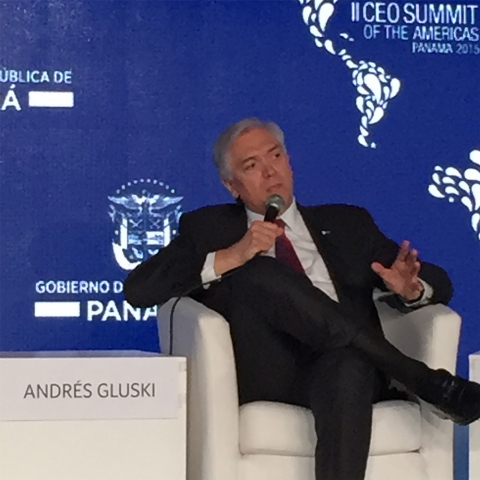May272015
Posted at 1:18 PM
Guest blog post by Andrés Gluski, President and CEO, The AES Corporation
Today, while the media and politicians are debating the President’s Trade Promotion Authority (TPA) and the Trans Pacific Partnership (TPP), it is a good moment to step back and reflect on why Free Trade Agreements (FTAs) should matter to all of us.
I am the current President and CEO of The AES Corporation, a Fortune 200 energy company with electricity generation and distribution assets in 18 countries. AES is not an exporter and does not compete with imports. However, we do manage $40 billion in assets globally and have a $9 billion construction program underway. As we purchase equipment and services to be deployed internationally, we find that FTAs, OPIC and the U.S. Ex-Im Bank are important factors in the competitiveness of U.S. capital goods.
For starters, let's agree on some basic facts. Overall, free trade has made the world a better place. Hundreds of millions of people have been lifted out of poverty, largely due to the opportunities freer trade has provided them. Billions of people are now enjoying the benefits of better and lower priced goods. It is not only a matter of price; imagine a winter without access to fresh produce from Chile and Mexico in your supermarket or how much cars have improved as a result of foreign competition.
Second, there are important geopolitical effects from FTAs. When the U.S. enters into FTAs, it allows us to play a role in the future of the global economic system. If the U.S. retreats from trade engagements with other countries, others will be more than happy to take our place. While the U.S. is still the world's largest economy in current dollars, it ranks behind China in terms of purchasing power parity. The global economy is increasingly competitive and our continued engagement ensures our role in developing institutions and policies that are consistent with our core values, such as transparency, rule of law and respect for the environment and human rights.
There has been much said about the North American Free Trade Agreement (NAFTA), which created the world's most efficient market by integrating the markets of Canada, Mexico and the US. While certain less skilled jobs have migrated to lower cost locations, NAFTA has actually made many American products more competitive by creating an integrated supply chain. It has also played a role in transforming Mexico into an advanced economy and stemmed net immigration from that country to near zero last year. For those concerned with uncontrolled emigration from lower income countries to the developed world, the best way to decrease economic migrants is to improve conditions in their home countries.
Having said all this, it is also true that the benefits from trade tend to be distributed broadly, while workers in less competitive industries may be displaced as a result of trade and technological changes. In both cases, training programs and support should be part of planning for the transition to a larger and more efficient market.
In today's rapidly changing world, FTAs are important for us, if we want the U.S. to retain its economic and political leadership. The TPP, in particular, will more closely align our economy with Southeast Asia, where the world’s fastest economic growth is expected, and provide greater access for American goods in large developed economies, such as Japan and Korea. It will support thousands of high quality export-based jobs in America and help us promote the values we hold dear through the effective use of our "soft power.” Turning our back on the promotion of free trade will only ensure a loss of American influence and economic dynamism at a time of increasing global competition. A new economic and financial order is arising as a result of the dramatic growth in Asian economies; it is unlikely that we will be able to play a more favorable or prominent role should we pass on this opportunity. Time will only be on our side if we are able to recognize and seize these opportunities.


